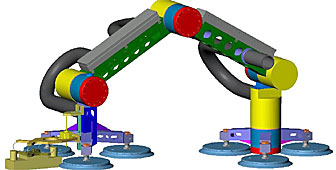Swiss foundation rewards young entrepreneurs

A device for cleaning the outside of skyscrapers is just one innovation to have been rewarded by a body set up to help young Swiss entrepreneurs.
At a ceremony in Solothurn, three innovators keen to turn their prototypes into reality were each handed a cheque for SFr100,000 by the W A De Vigier Foundation.
The foundation, set up by and named in honour of a Swiss businessman who made his fortune in London, rewards entrepreneurs it believes have both an innovative idea and the will to set up in business on their own.
Cleaning windows
One of the three award-winning innovations unveiled at this year’s ceremony was the “clean ant”, a remote-controlled robot capable of climbing and cleaning the tallest buildings in the world.
The entrepreneur behind the robot, 26-year-old Paul Luthiger, says his device is practical, cost-efficient and could also save lives.
“It is very dangerous to climb 200 or 300 metres up the side of a building with cranes,” Luthiger told swissinfo.
“So we thought we would develop a robot which could do this and clean at the same time. And when you think that every year on average five people are killed in accidents while cleaning building exteriors, that is five deaths too many,” he added.
Rewarding innovation
Two other pairs of innovators were also selected by the foundation to be award recipients in 2002.
Grégoire Ribordy, a physicist from Geneva, together with his business partner, Olivier Guinnard, came up with what they claim is a foolproof means of guaranteeing the security and confidentiality of electronic mail and transactions through a sophisticated use of encryption.
The final pair of award winners, Christoph Affentranger and Otto Hofstetter, presented the foundation with an eco-friendly innovation for the 21st century: how to turn sawdust and discarded chippings into a pliable wood for use as building material.
For all three, the prize money marks a first step towards establishing themselves as young entrepreneurs in charge of their own companies.
The foundation says it rewards those candidates who show both a flair for innovation and an intuitive sense of how their product might become the means of starting up a profitable company.
De Vigier himself – now in his 90s – is proud that of the 40 start-ups his foundation has helped to create since the first awards back in 1987, 33 are still in business today.
Successful entrepreneurs
Moritz Suter, president of the foundation and founder of Crossair – the Swiss regional airline which re-launched last April as the country’s new flag carrier, “swiss” – says the most successful entrepreneurs are those who are prepared to take risks.
“If you want to be an entrepreneur, you have to like taking risks, because without risk you cannot do anything,” Suter told swissinfo.
“A good entrepreneur is somebody who is absolutely convinced about what he is doing and someone who devotes all the capability he has to make his idea a success,” he adds.
Suter believes Switzerland is an excellent breeding ground for young people who have the will and determination to set up on their own.
“Switzerland is a very attractive place for young people to start their own businesses, because the tax system is supportive and the labour regulations are very flexible,” he says.
Land of opportunity?
But Suter’s positive view of Switzerland as a land of opportunity for budding entrepreneurs with both innovative ideas and enough start-up capital is not shared by the current vice-president of the De Vigier Foundation, Jean-Claude Strebel.
“There is a lot of money sitting here [in Switzerland],” Strebel says, “which could be invested in new projects.”
“But the Swiss people are very careful. They like saving their money, they like bonds and possibly buying some shares, but going into ventures is a big step which a lot of people are not prepared to do,” he adds.
Strebel says few young Swiss are prepared to take the risk of launching out on their own.
“Our young people are very spoiled, because once they finish their studies, they can go to very good companies and get big salaries,” he comments.
“And of course it’s much easier to get a salary of 150,000 to 200,000 francs than to go ahead with your own project as an entrepreneur with all the risk that entails.”
by Ramsey Zarifeh

In compliance with the JTI standards
More: SWI swissinfo.ch certified by the Journalism Trust Initiative
You can find an overview of ongoing debates with our journalists here . Please join us!
If you want to start a conversation about a topic raised in this article or want to report factual errors, email us at english@swissinfo.ch.